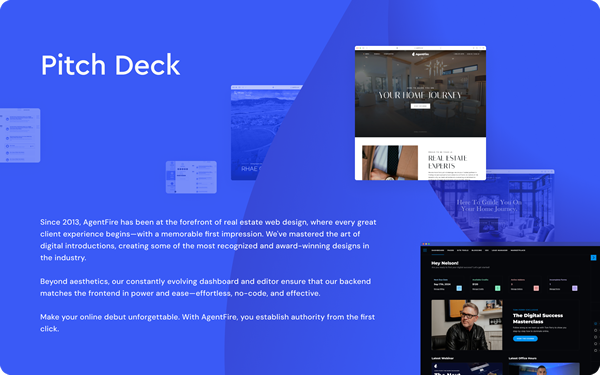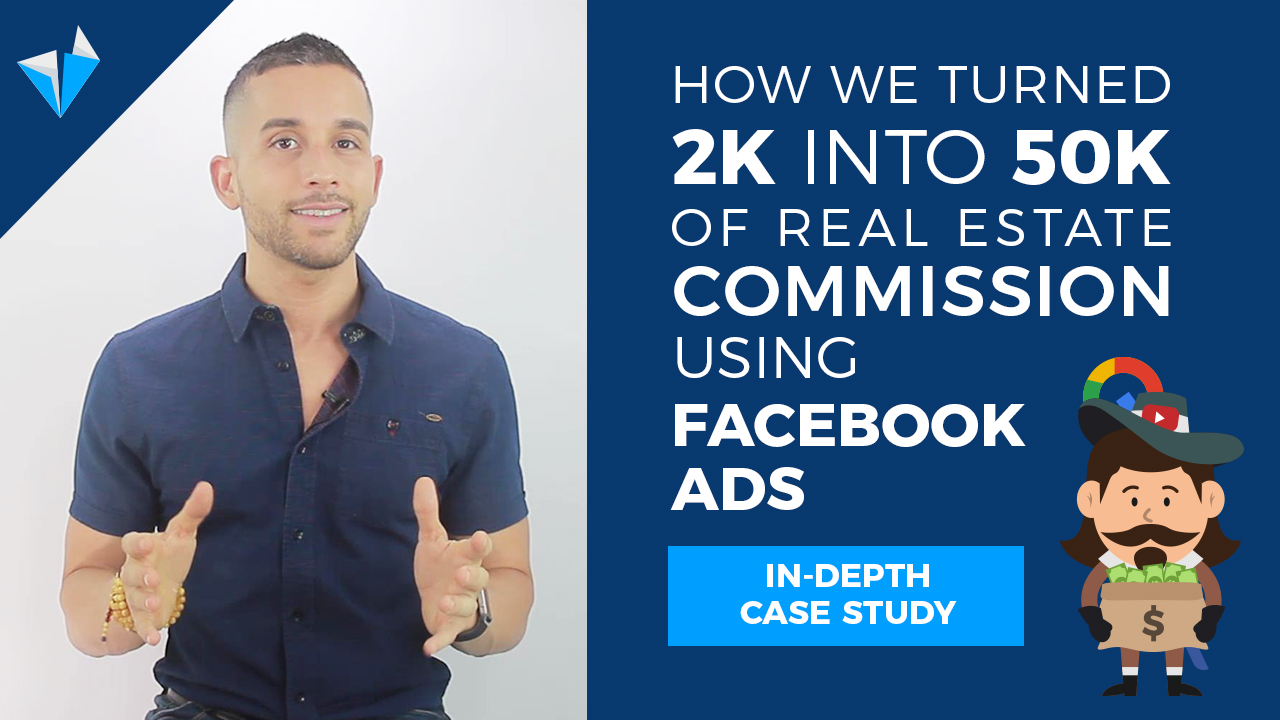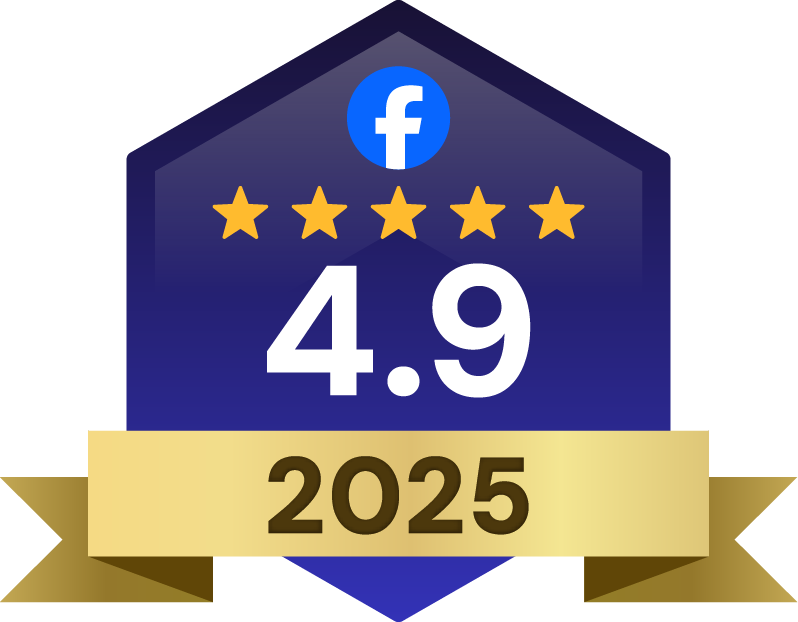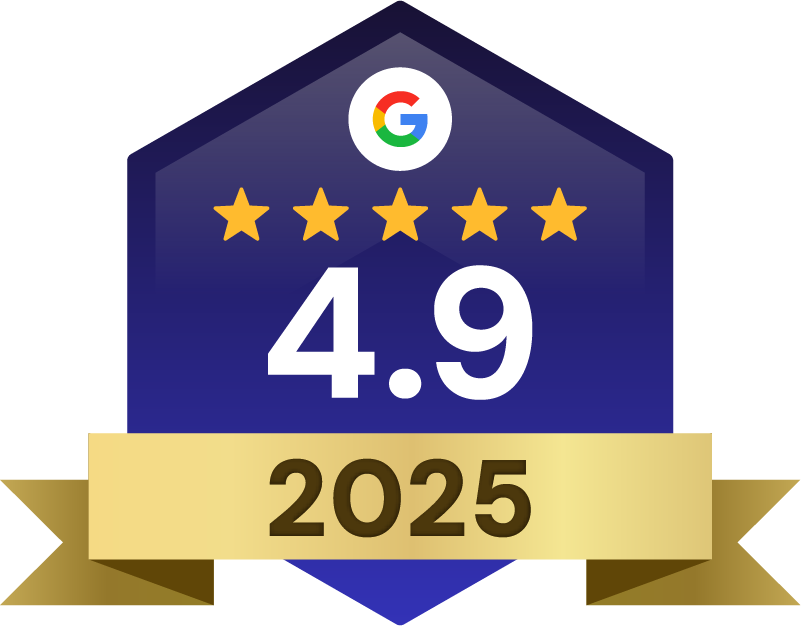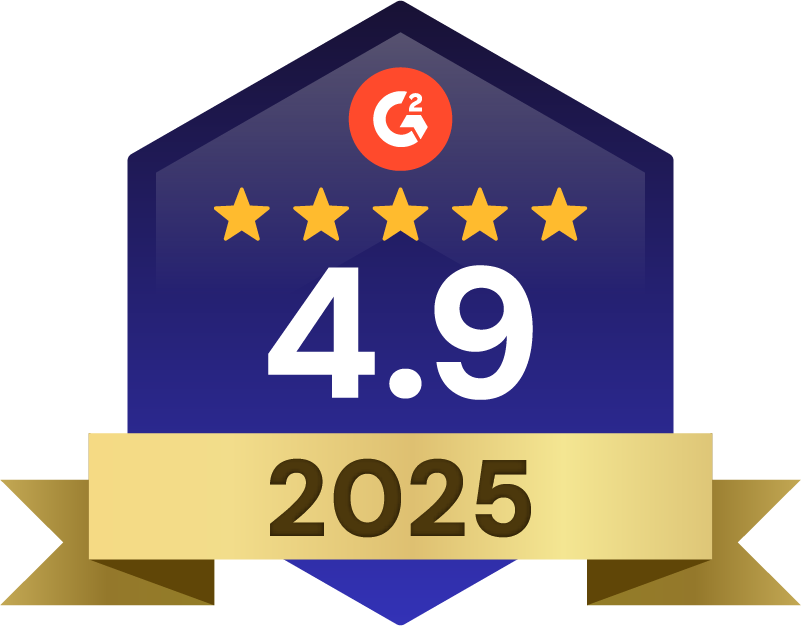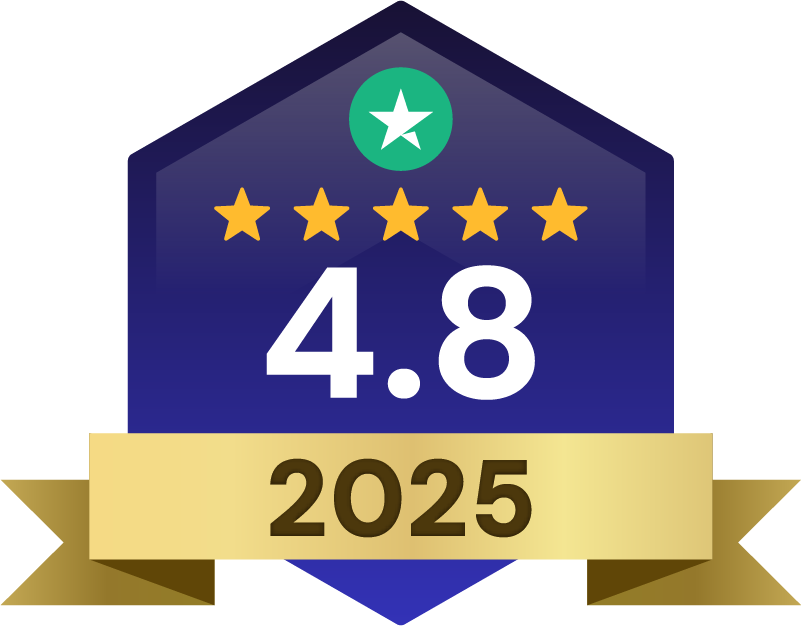In this video and article, I'm going to give you something very different than what you’re used to. My goal here is to basically create the definitive case study for how to generate maximum ROI, for real estate, using Facebook and Google marketing. Just pure, unadulterated value.
Branding & Design Industry Insights Lead Generation
Finally, an amazing resource??
Nelson here from AgentFire.com. If you’re like me and you’ve tried searching for articles or videos on real estate marketing strategies for Facebook and Google – you already know that it’s slim pickings. Everything I found (and believe me, I looked) seemed to be vapid, superficial type content with vague suggestions and limited to no supporting evidence.
So in this video and article, I’m going to give you something very different than what you’re used to. My goal here is to basically create the definitive case study for how to generate maximum ROI, for real estate, using Facebook and Google marketing. Just pure, unadulterated value.
If you get to the end of this article/video and feel like you’re not walking away with multiple gems that have the potential to dramatically improve your online real estate marketing, then I will personally bake and mail you a cookie (you pay the shipping & handling).
Now with that said… shall we begin? ???
$2500 and 2 months
I first had the idea to create this case study a few months back.
Anyone that knows me knows that I love a good challenge. My life is basically one big challenge (I’m currently making a documentary about my relentless but measured approach to achieving my potential in my physical, mental, spiritual, business, and a 2nd language). So I couldn’t just make a simple case study… instead I needed a really challenging scenario.
And here it is: We decided that we would take a budget of $2500 dollars and a time frame of 2 months – and challenge ourselves to generate the highest ROI possible using Google and Facebook marketing.
Put in other words, “here’s $2500, you’ve got 2 months to generate the most ROI that you can… GO”
Our Client: Janie Howard
Did I mention that I like challenges? 🙂 To make this even more interesting, we decided to pick a client from one of the most competitive markets in the entire USA.
Meet Janie Howard – she’s a really really good human being, and she’s also the owner of Woodleaf Realty, a small brokerage located in the ultra-competitive market of Colorado Springs, CO.

Janie’s overall experience when it comes to online marketing and ad-spend is very reminiscent to what I’ve heard over the last year from practically every agent I’ve discussed online with – let me know if this sounds similar to you:
- Doesn’t really know where to start when it comes to marketing their website
- Has spent money on Zillow and not happy with the ROI
- Mixed to little results in other online marketing attempts
Despite her best efforts to generate leads for her team, Janie was not finding success. If you want more insight into her overall experience with us, you can read her review below. Her websites are woodleafrealty.com and more recently coloradospringsmilitaryhomes.com (which we launched after the success of the campaigns we’ll be discussing in this article / video, and mayyy be the subject of another case study like this one if enough people ask for it… more on that at the end of this article!)

![]()
Our Results – A Quick Summary
With the $2500 budget that we had to work with, $2300 of the budget was allocated to Facebook marketing. From that we were able to generate over 768 leads, with some other pretty insane stats: $.38 cent cost per click, $2.98 cost per lead, and a 3.647% click through rate!
In this snapshot we’re showing our overall results for Facebook Ads, which span 14 different campaigns (including campaigns where tweaks were made).
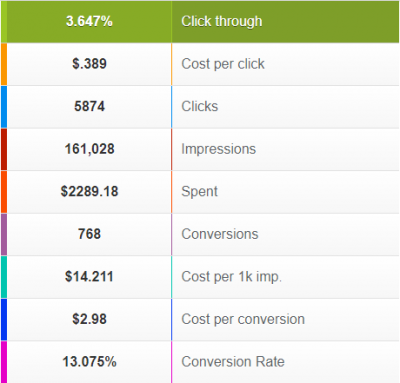
The remaining part of the budget ($200) we allocated to Google Remarketing. There we were able to generate 472 clicks at .44 cents per click.
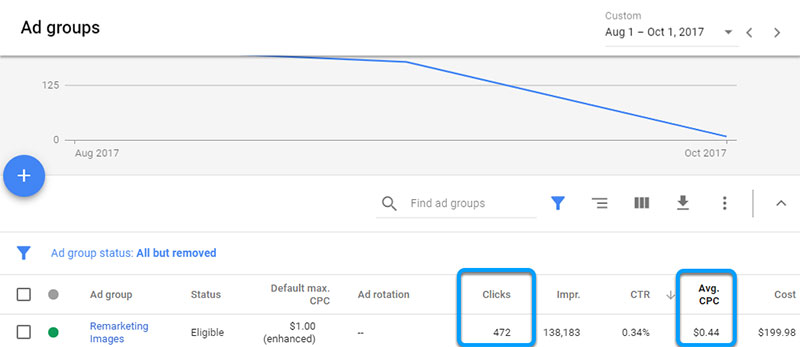
This was all done in just a 2 month span.
Now, based on all of the closed deals that we’ve been able to link directly to these campaigns, Janie and her team have been able to close over $50,000 in net profits from real estate commissions – that represents a 20x ROI!
And what’s more – this number does not include profits from new deals over the next months and years that Janie will close thanks to our carefully executed drip email and remarketing campaigns…. The actual ROI when all is said and done will be even higher!
How we Researched
Colorado Springs is an interesting market as it’s got a very wide range demographically speaking – first-time homebuyers, new construction, people looking to upsize, people looking to downsize and military relocation, just to name a few.
Given that we ourselves were not familiar with the area, the first thing that we did was sit down with Janie to discuss her market and to get a general idea on where she felt that the best opportunities might be.
After gaining insights and understanding about the market from Janie herself, we did some keyword research, as well as competitor research to see what other agents in the area who were really getting busy with online marketing were doing.
Pro Tip: Your goal when doing research, should never explicitly be to just get a list of keywords to target. Instead it should be to identify where the real opportunities are within your market and develop a plan of how to best capitalize on them. Here’s how we did that within Janie’s market.
Keyword Research
For keyword research, my favorite tool is SEM Rush – without question. It gives you info for both PPC and organic traffic and can help identify both short and long tail keyword opportunities.
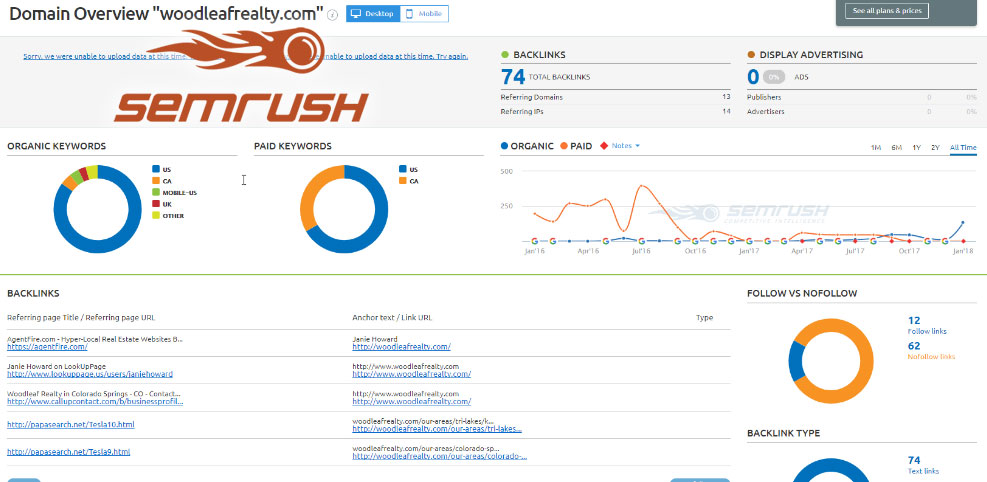
This is a paid tool, so if you want to use a free tool, my recommendation is to just use Google’s Keyword Planner.
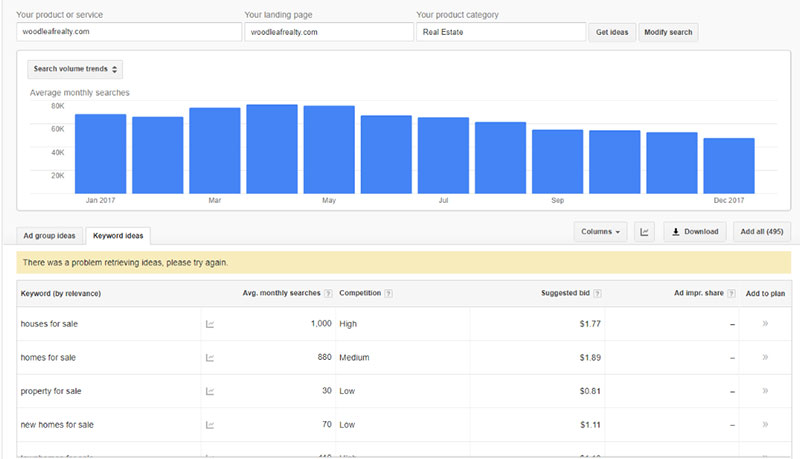
Once we had a list of keywords and phrases that we felt represented the best ROI opportunities, it was time to check out the competition a bit.
Competitor Research
To check out competitors we used a tool called Spyfu – if you’ve never heard of this, you now at least owe me a cup of coffee ☕.
What we love to do when working on a campaign is to first check out what savvy local area competitors are doing with their PPC keywords – Spyfu delivers all of that information to you on a platter. So if you’ve got a savvy competitor that’s absolutely killing it with their online marketing, you can check out not only which keywords they’re using, but roughly how much budget they’re allocating to those keywords.
It’s generally pretty fair to infer that if a competitor is dumping a massive amount of coin into a specific keyword or set of keywords, it’s probably because it’s working for them. This is my top piece of advice when it comes to formulating the initial strategy for your own campaigns!
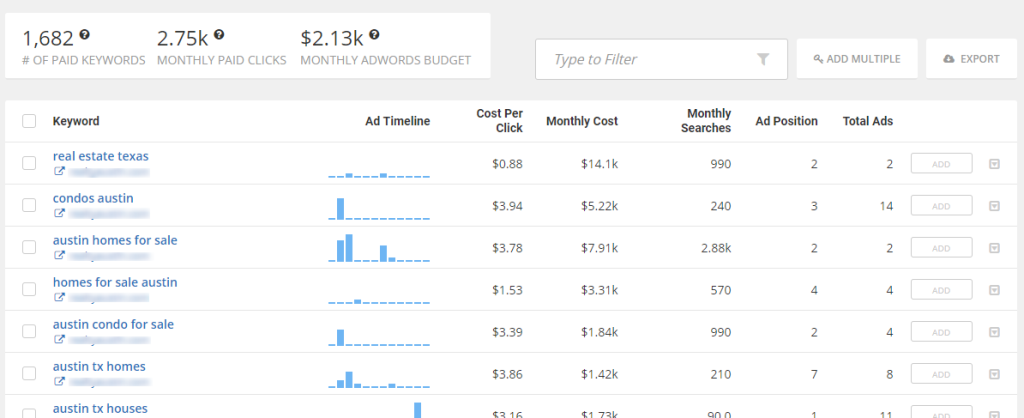
Now the other possible scenario here that you have to be careful to watch out for, is that your competitors have no idea what the hell they’re doing and are just arbitrarily dumping massive amounts of dollars into a campaign just hoping for a positive result. That may sound like a joke, but this actually happens a lot… like… literally more than 50% of the time. This is why I said to focus on ‘savvy’ local area competitors.
If you’re checking out PPC for “Brenda”, the local agent whose built up a massive referral network but doesn’t know how to text message, whose now running her own online marketing campaigns, don’t expect to find any gems.
Spyfu isn’t free, but if you’re going to be running your own campaigns, I can’t recommend it enough. Even if it’s just for this one feature.
Niche Markets With Facebook Marketing
So after doing our research and considering everything, we determined that to start, we were going to focus two individual niche markets that we felt represented the best opportunity to generate high ROI. Those markets were:
- Downsizers
- First Time Homebuyers
We decided that the best platform to attack these niches was Facebook, which we’ll explain here in a second. First let’s give you a macro perspective of exact formula that we used (and that you can re-use) to generate maximum ROI on the campaigns that we ran.
The Simple Formula for High ROI Real Estate Ads
Below is a macro level overview of the exact formula we used to generate massive ROI for Janie. It’s also what we feel confidently is the best way to find success specifically with Facebook focused marketing.
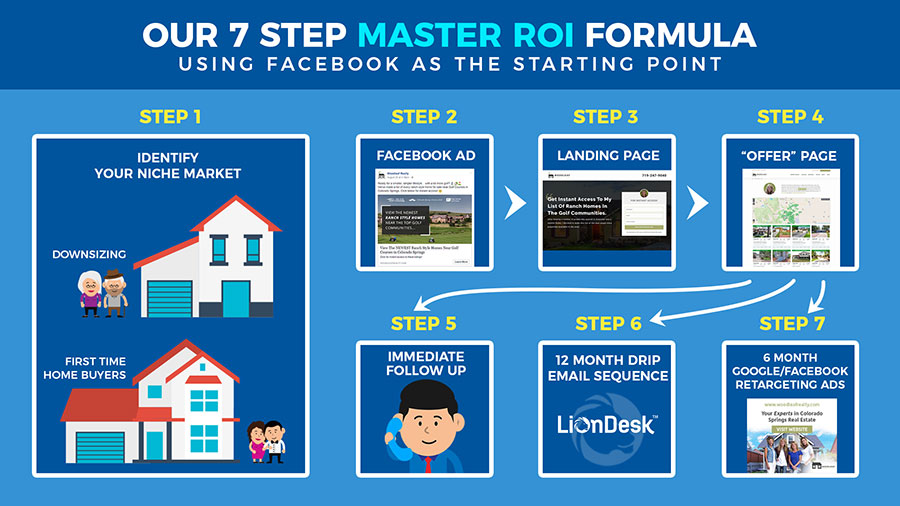
Does that seem like a lot? It’s really not… and to help you out we’re going to break down each individual step for you and go into vivid detail.
Once you get the swing of things, each one of these steps could be set up and repeated for different target niche markets in just a few minutes. Rinse and repeat!
Let’s go ahead now and show you how we applied this formula to Janie’s first campaign, step by step.
Step 1: Identify a Niche Market That You Can Target
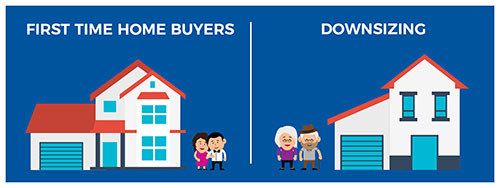
Every real estate market is different, and each one of them has their own unique opportunities. When I say ‘niche’ what I’m referring to is anything deeper than “buyer” and “seller.” Niche markets could include:
- Looking to downsize or upsize
- First Time Homebuyers
- New Construction
- School Districts
- Relocation
- 2nd Home Markets
- Golf Homes
The list goes on and on. One of the great things with Facebook marketing, in particular, is that it allows you to target users on an unprecedented level – There are diamonds here just waiting to be discovered.
As an example, without a doubt, the most niche campaign we’re currently running for a client right now involves targeting families from South America who have relocated to the Washington DC area for Technology Jobs and are looking to buy! This level of ‘niche’ is entirely possible with Facebook marketing!
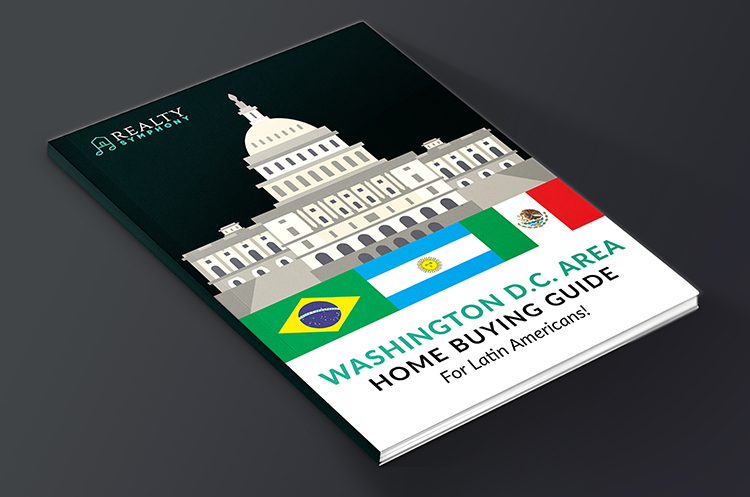
In Janie’s case, we determined that the ‘looking to downsize’ market was a great one for us to target because Colorado Springs has a large population of middle-aged homeowners living in large homes that they no longer need, mainly because their children have already left the nest.
With a niche market selected, next you need to figure out how you’re going to target them… this is where Facebook Ads TRULY shine! They give you tons of fantastic demographic targeting options that will allow you to really zero in on your niche.
For our ‘downsizing’ campaign, we determined that the people we wanted to see our ads most likely met the following criteria:
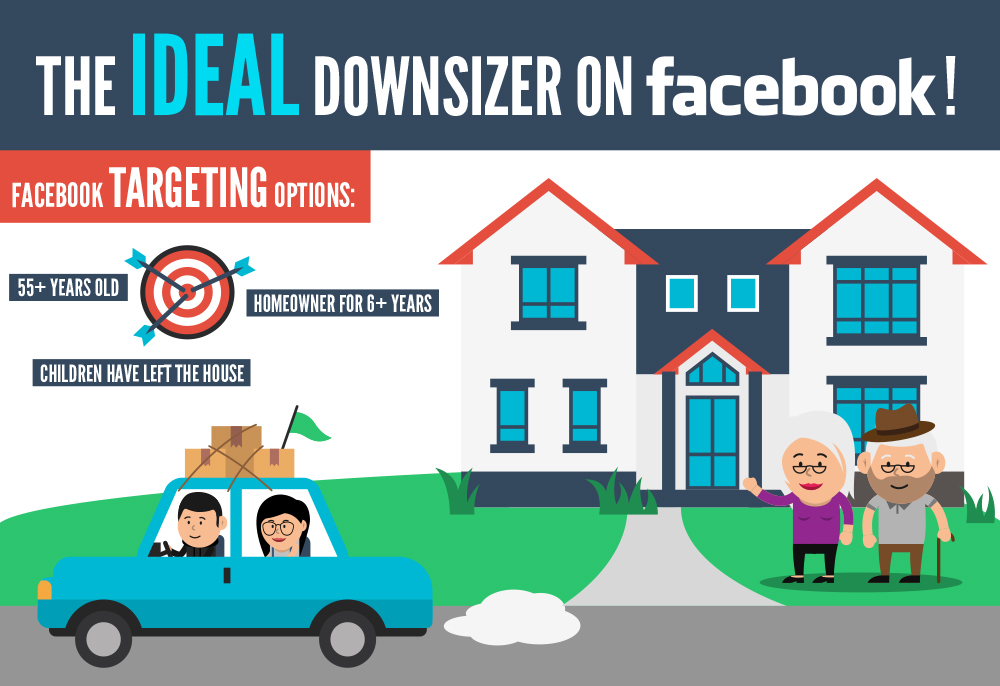
Now here’s exactly what we targeted in Facebook:
1.1 Basic Targeting:
- Location: We targeted our ads to a +10 mile radius of Colorado Springs
- Age: We’re targeting a ‘downsizing’ demographic which tends to be an older group, so we targeted 55 and up.
- Language: Anyone that speaks English 🙂 If you’re bi-lingual, you should definitely target any relevant languages.
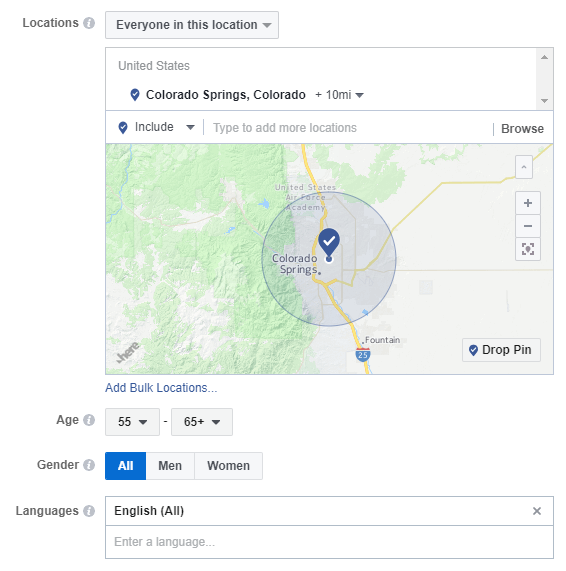
1.2 Advanced Targeting: INCLUDES
Here are all of the Include targeting methods we used (users who met this criteria we included in our audience) along with a short explanation of each one.
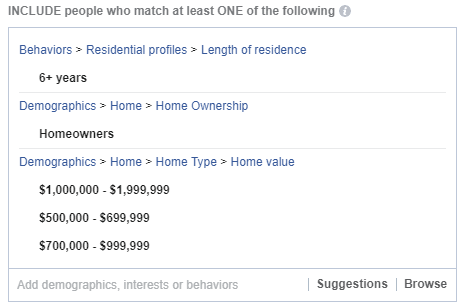
- Behaviors > Residential Profiles > Length of Residence > 6+ Years
Given that we’re targeting downsizers, we figured that anyone that’s been living in their home for less than 6 years is going to be much less likely to sell (according to the National Association of Homebuilders, the average buyer stays in their home for an average of 13 years.) - Demographics > Home > Home Ownership > Homeowners
We obviously want to target people that own homes 🙂 - Demographics > Home > Home Type > Home Value > $500k+
1.3 Advanced Targeting: Excludes
Here are all of the Exclusions that we setup (users who met this criteria we excluded from our audience).
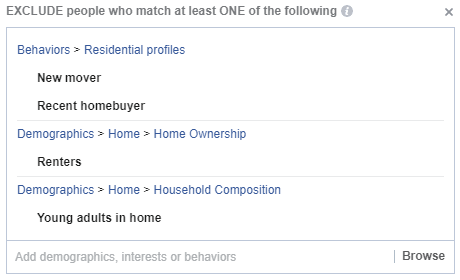
- Behaviors > Residential Profiles > New Mover / Recent Homebuyer
Again, since we’re targeting people looking to downsize, we don’t want to be targeting anyone that has recently purchased a home. - Demographics > Home > Home Ownership > Renters
Can’t sell a home that you’re currently renting! - Demographics > Home > Household Composition > Young adults in home
Our ‘ideal’ market consists of older homeowners whose children have left the home.
1.4 Notable Mention: “Likely to Move”

Facebook does have a targeting option for ‘Likely to move‘. However, for whatever reason, we’ve almost always had better success not using it. I wish I had a better explanation but I don’t. Definitely A/B test yourself as your results may be different.
1.5 Notable Mention: “Income and Net Worth”
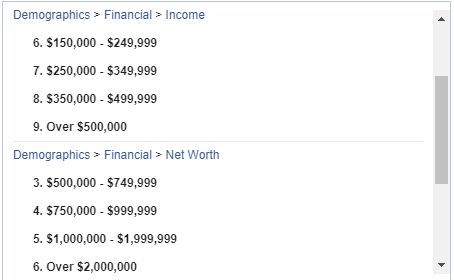
Financial targeting like ‘income’ and ‘net worth’ have also been invaluable with most of the campaigns we’ve run. For the ‘downsizing’ market though these options weren’t important.
FYI Google Adwords also allows you to target by income (the only difference is that on Google, you’re targeting by what ‘percentile’ people are in, in regards to highest and lowest incomes).
Step 2: Make Your Offer An IDX Results Page – Call it a “List”
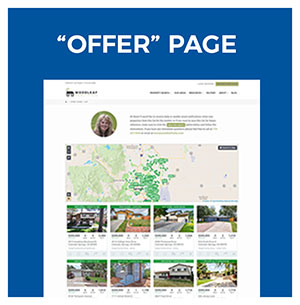
Now while we have had lot of success for campaigns offering guides, buyer/seller rebates, or other methods – these are a bit more involved to get setup.
If you’re looking for a high value campaign that can be setup in minutes, one of the easiest and most effective ways to create an offer with high ROI is to simply use a ‘curated’ IDX results page.

For our ‘downsizing’ market – we achieved this by offering a list of all of the single story homes for sale in the area. To do this, using Janie’s IDX, we simply created a saved search page with the following criteria.
- Property Feature: 1 Level (aka single story homes)
- Location: Colorado Springs
Pretty easy no?
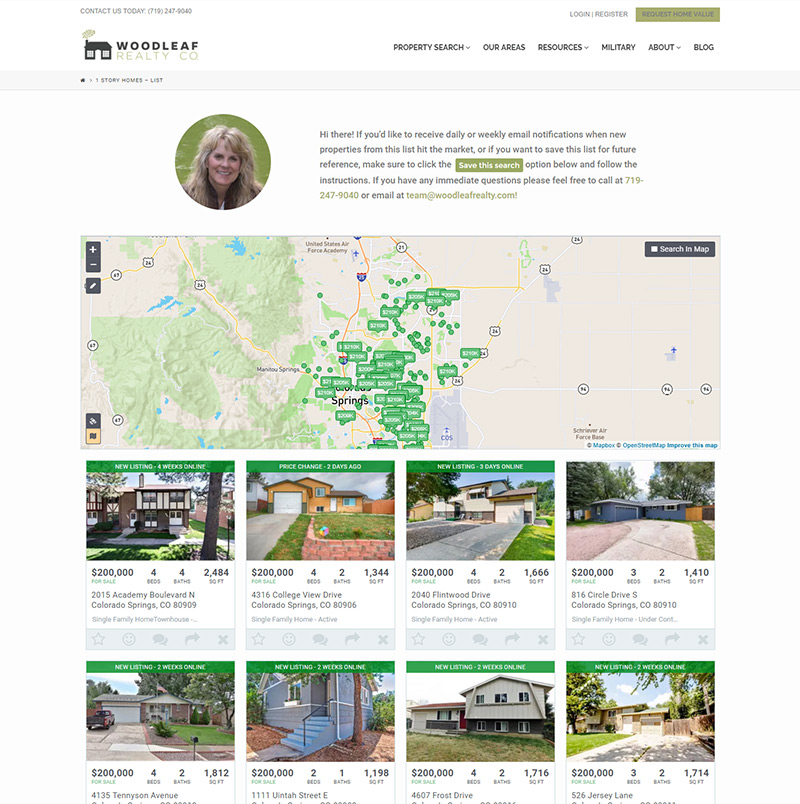
Step 3: Create Compelling Ads
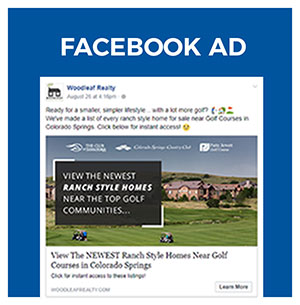
Here are our first set of ads for the ‘Looking to Downsize’ campaigns that we ran.
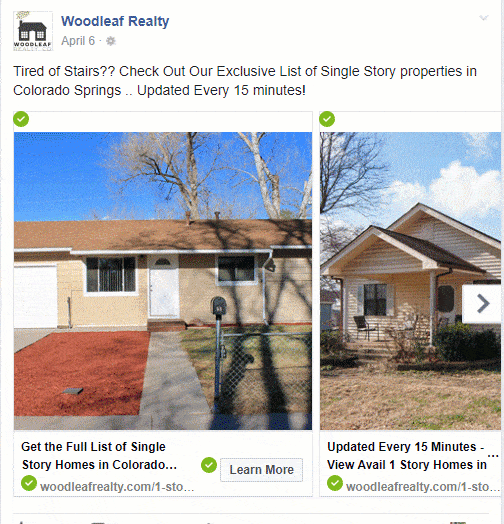
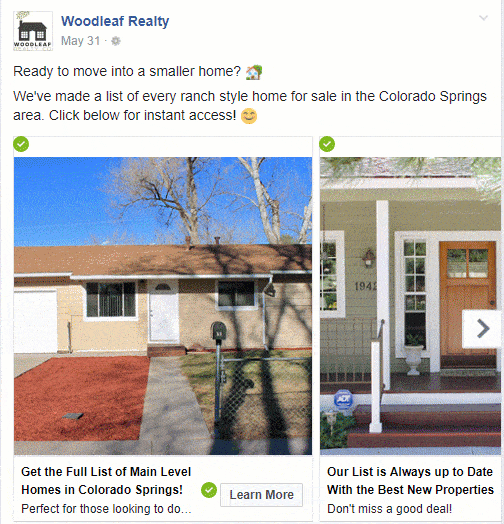
3.1 The Logic Behind These Ads
We decided to go with a Facebook Carousel Ad. This ad type allows you to show up to 10 images (or videos), along with headlines, links, and call to action, on individual cards.
We chose this format because we had many different ‘value points’ that we wanted to feature in our ads, and a carousel format allowed us to succinctly feature a different ‘value point’ on each individual card.
As you can see from the above graphic some of those were:
- Our List of Single Story Homes
This is the main ‘value offer’ for our demographic – that we’ve created a ready-made list of single story homes ready for them to view – so it was important that we feature it in the actual copy for our ads. - Updated Every 15 Minutes
Janie’s IDX – ShowcaseIDX – updates their results every 15 minutes or so, which is actually a huge advantage over other MLS’s and portal sites like Zillow. We wanted to feature that as a ‘value point’, knowing that consumers always want the most up to date info. - Sign Up For Updates
We understood that many of the people seeing our ads are not quite ready to pull the trigger. For that reason, we wanted to advertise as a ‘value point’ that you’d be able to sign up for daily or weekly updates.
We also tested a number of different Ad Texts – for Carousel ads, Ad Text is the short paragraph above the carousel portion) – Our goal here was simply to present our offer – our list of ranch homes – in a way that effectively resonates with our target audience.
3.2 How to Create Your Own Ads
So, as you can see via the carousel ad example above, we didn’t need to do any fancy design work. We simply found some good looking single story home photos of homes Janie has listed in the past, and used those.
However sometimes, you want to create something a little fancier, like these:


Two recommendations for ya.
First is Fiverr.com – do a search for Facebook Image Ad and click ‘Social Media Design’ from the ‘refine results’ list – you’ll find tons of great gigs where you can get quality images created for your ads for as little as $5.
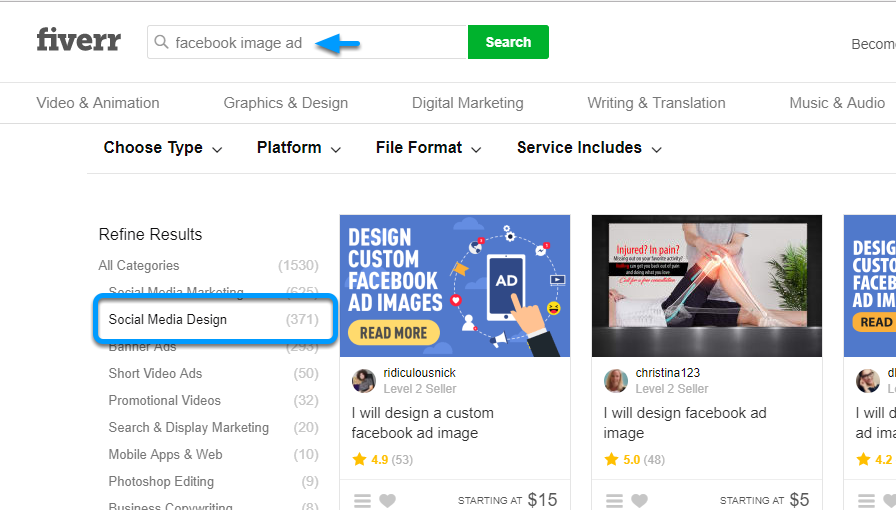
Next up, for those who want to create their own ads, is Canva.com. It’s really simple and you can take pre-existing templates, and simply swap out the background image and some text and in just a few minutes, you’ve got an ultra-professional looking ad.
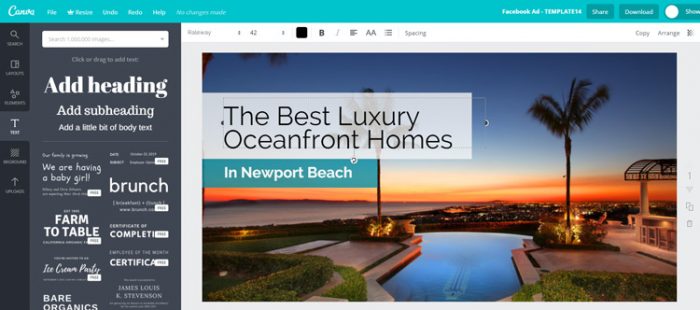
3.3 A/B Testing… Easier Than You Think
If you’re going to truly get the most out of Adwords/Facebook Ads, you need to A/B test!!! I know that sounds scary, now let me show you exactly why it’s not!
Between my company and our clients, I’ve personally managed over $300k in ad spend… and even with all of that experience I still routinely see statistically significant results that make my head spin.
One example of this is one I gave previously – how I’ve had better results generating seller leads when not using the ‘Likely to Move’ Facebook targeting option.
What works in one area may not work nearly as well in another. Desktop ads may convert better in some areas than others – males may convert better than females or vice versa… So A/B testing is really important, and again, it’s easier than you think!
At the most basic level, you could simply launch 2 or 3 campaigns with different headlines, ad texts, and images. Then, once you have some data, i.e. 50 total conversions, you’ll start to see which campaigns are clearly doing better than others – lower cost per click, lower cost per conversion, higher click-through rates etc – and then you can just put more budget into the stuff that’s working the best.

Here at AgentFire, we use an awesome tool called AdEspresso. I’d like to share a short story.
When I first started with Facebook Ads back in 2014, I paid someone $750 to help with AgentFire’s marketing. This person was an idiot, but they did introduce me to AdEspresso, and for that reason, I consider my $750 money well spent.
AdEspresso’s base price is $49/month and covers the needs of 99% of people reading this article (up to a $3000/month ad budget) – if you’re going to be going to war with Facebook Ads, it’s a weapon you should be armed with.
Here’s a screenshot of a recent campaign we launched for Janie using AdEspresso:
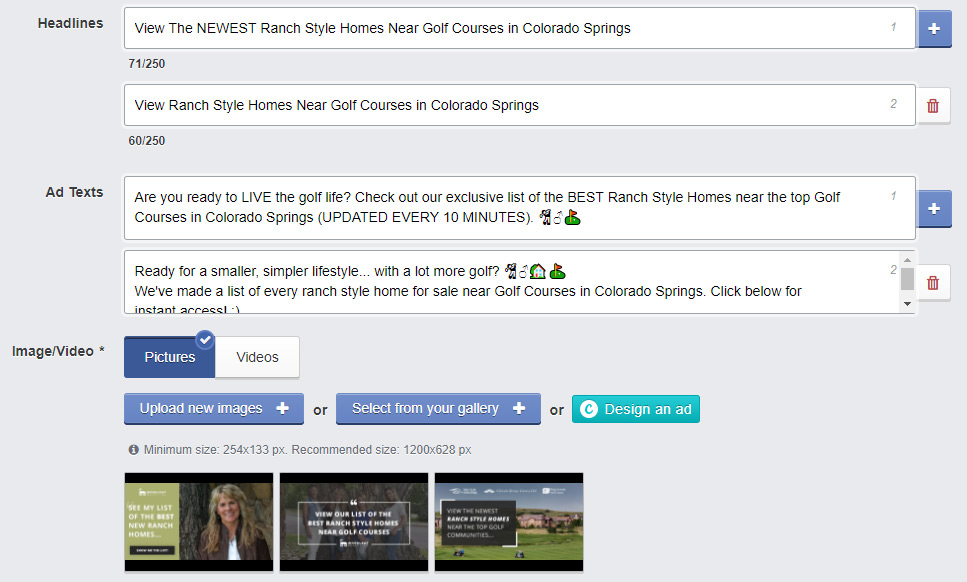
As you can see, we’re testing 2 Headlines, 2 Ad Texts, and 3 Ad Images – it’s really easy to do that right? Then when you’ve got all of your different variations set, you simply publish and AdEspresso will actually mix and match all of those different variations to create individual ads using every possible combination – so in this example, 2 x 2 x 3 = 12 Different Ad Variations – all published with just a single click of a button!
AdEspresso will then track each of those 12 ad variations and show you individual stats for each one, so you’ll know exactly which ones are working and which ones aren’t!
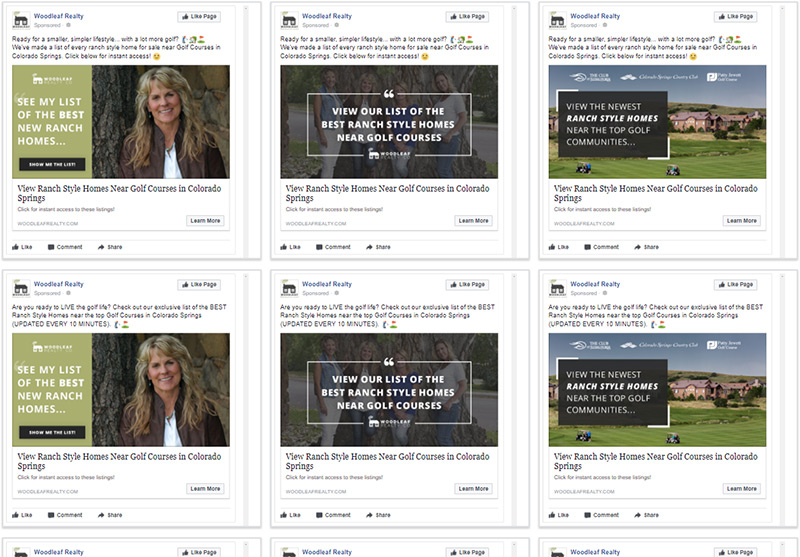
3.4 Keys to Compelling Ads
As far as selecting your ad image and writing the copy for your ad – don’t overthink it.
Your ads should try to achieve a pretty even mix of all of the following:
Grab Attention
Always use a relevant image that’s likely to stand out.
Value Proposition
Once you’ve got their attention, you need to create an enticing enough of an offer to get them to click, but make sure it’s value based and not spammy crap! Don’t advertise something like ‘the secret to getting top dollar for your home’ and then link to a 250 character article that you copied from inman about why they need to work with a real estate agent – you’re just going to make people angry.
Pain Points
Every single niche market has multiple pain points. For example, with our ‘first time homebuyer’ campaigns, we know that finding homes near top school districts is generally a ‘pain point,’ so we leverage that into the copy/offer.
Be Personal
Seriously, make sure you sound like a down to earth human, and not a used car salesman.
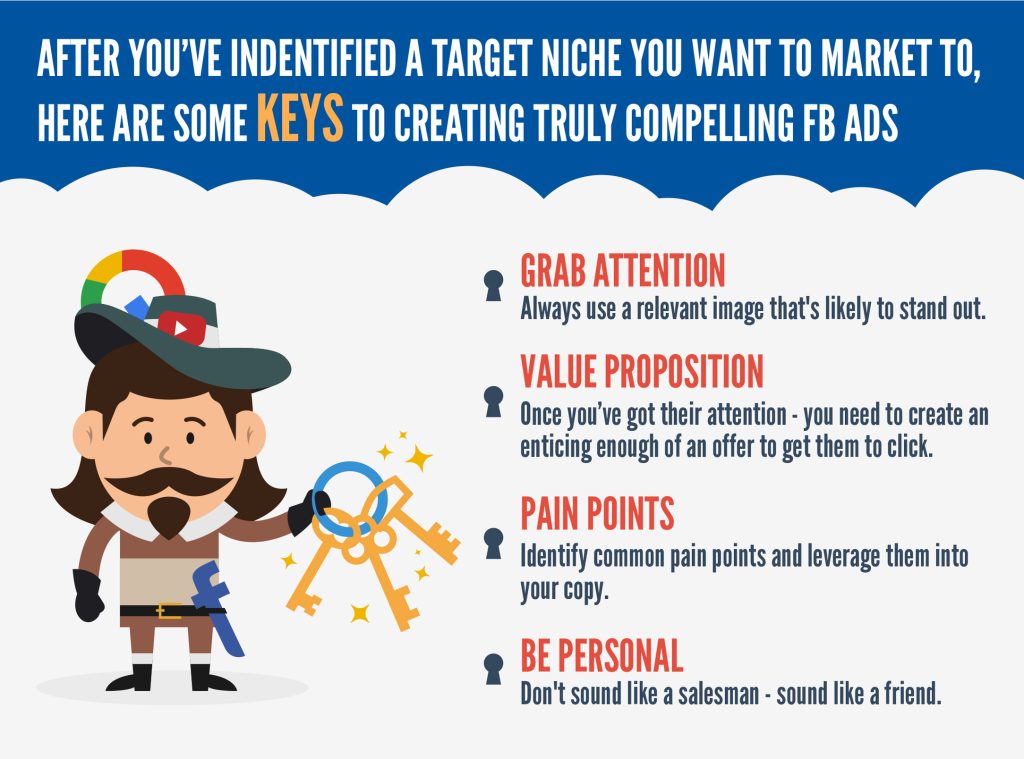
3.6 Emoji Power ⚡
? Fun fact: in all of the A/B tests that we ran where one ad copy had emoji’s, and the other didn’t, the ad with the emoji’s converted better! ???

If you want to quickly sprinkle emoji’s into your ad copy, check out emojipedia.com where you can search every emoji known to man – when you find the ones you like, just copy and paste.
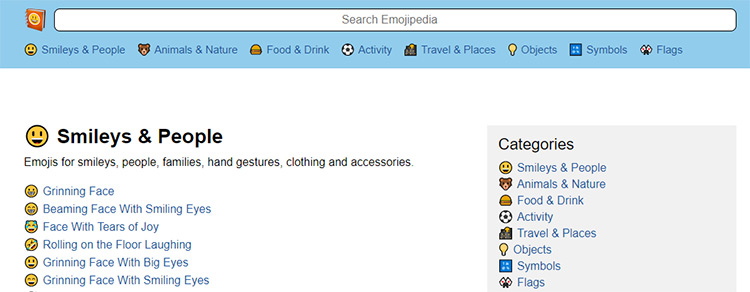
Step 4: Create A Simple Landing Page

The landing page is the page that users are directed to after they’ve clicked one of our ads.
The goal of the landing page is for the user to enter their contact information in exchange for whatever you’re offering (in this case, we’re offering a list of single story homes in Colorado Springs).
We’ve tested many different landing pages for Janie’s campaigns, here are some examples:
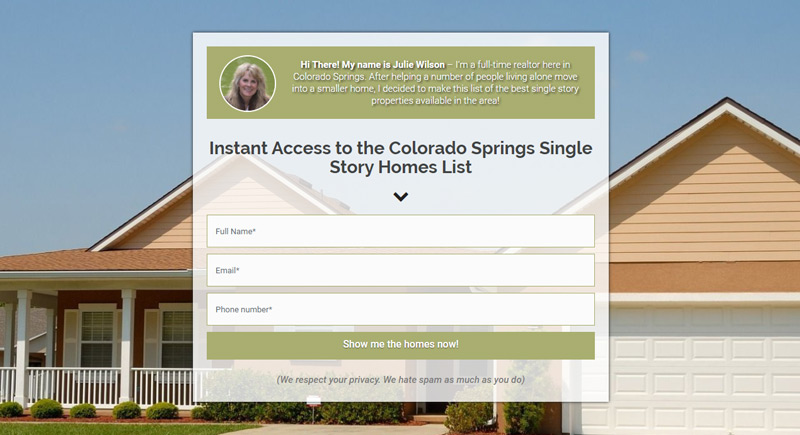
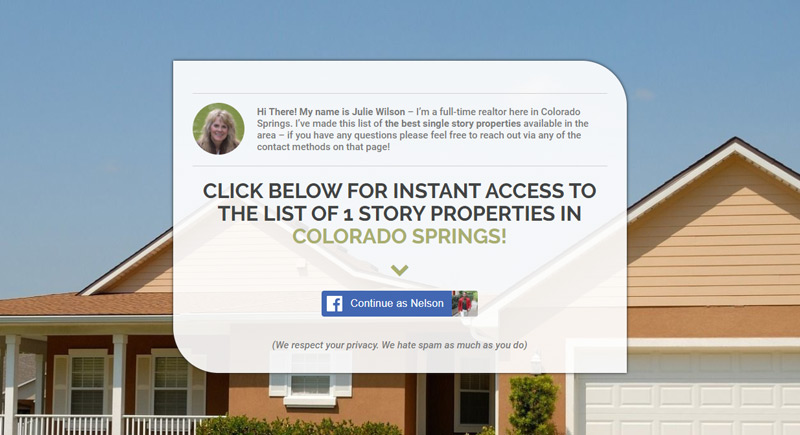
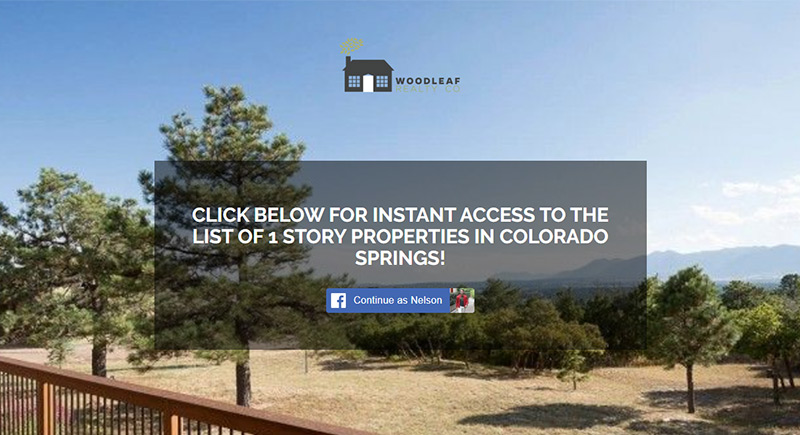
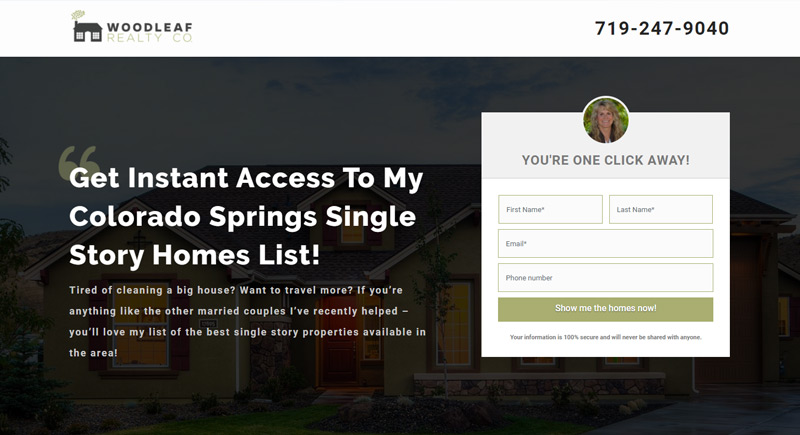
4.1 How to Create a Landing Page
So here at AgentFire, we use AF Lead Pages. It’s our killer real estate landing page solution which allows you to create and deploy high converting landing pages that are completely optimized for Facebook and Google Market in just a few clicks.
Our sites also seamlessly integrate with leading 3rd party CRM’s like LionDesk and Followupboss – so of course, to create killer landing pages, my top recommendation is for you to just sign up and see for yourself why this is just one of many industry-leading features that made us the top publicly reviewed real estate solution of all of 2017 – *cough* does this count as a sales pitch? ?
Buuutt, just in case for some odd reason you don’t want to sign up, then I do have a couple of pretty good alternatives to recommend.
Now the top 3 ‘landing page’ builders in the world – and you’ve probably heard of them – are leadpages, instapage, and unbounce.
As for my personal favorite? Definitely instapage.com.
In my most recent visit to instapage’s website, I wasn’t able to find a way to filter by ‘real estate’ – but if you check their lead generation templates, you’ll find tons of great real estate landing pages.
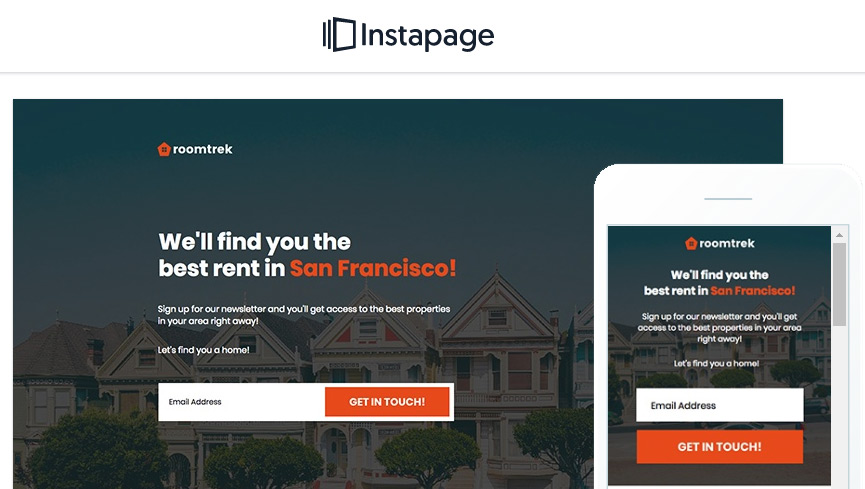
Now… for the same monthly price as instapage, you could just sign up for AgentFire and get tons of real estate optimized landing pages -along with a drop dead gorgeous website loaded with tons of other features ? – but I digress!
4.2: Should you require phone numbers?
This is probably the question I get the most when it comes to setting up landing pages, and the answer really depends on you.
The reality is that no matter how you slice it, you will get fewer people that opt-in on your landing pages if you require a phone number.
In Janie’s case – having phone numbers was a critical part of her follow-up process, so we did require them.
However in other campaigns that we’ve launched, where we’ve also had really well crafted drip email sequences setup (more about that later), we’ve seen great results as well.
One important note is that if your landing pages are using Facebook or Google Logins, you won’t be able to capture phone numbers… unless…
Here at AgentFire (ok ok, last sales pitch I promise) – we’ve developed a great workaround to that problem.
We’ve built out a 2 step, Social Login –> Phone Number setting, so that when users opt in on your forms via Facebook or Google, we then reveal a 2nd step to collect their phone number. Even if they don’t enter their phone #, we’ve already captured their name and email in the first step!
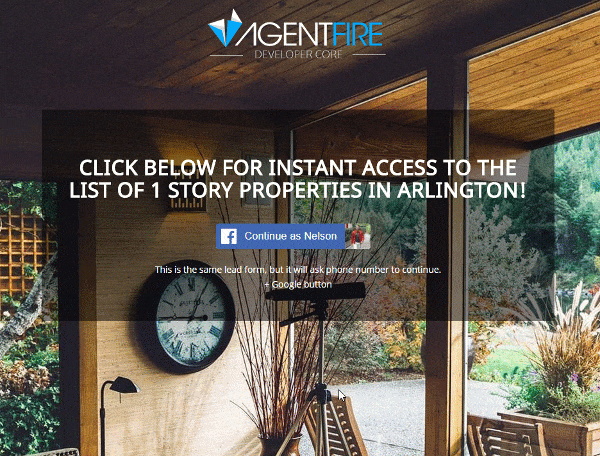
Step 5: Immediate, Friendly Follow-up
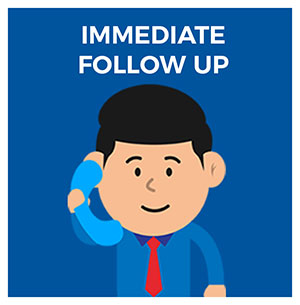
I’m not an expert here so I reached out to Janie for some pointers, and she provided some real gems which I’m going to summarize below:
Follow-Up Immediately
Reaching out to a fresh lead within minutes will almost always trump what you say. In other words, if you respond immediately and it’s a legitimate buyer, it almost doesn’t matter what you say. If you can’t do that, then you should leverage scripts that involve asking questions and offering value.
Use Scripts
Ok so don’t literally have a script in front of you that you read verbatim, but rather develop some sort of intelligent, repeatable approach for how you’re going to follow up with leads depending on the sort of campaign that you’re running. A quick google search for ‘real estate scripts’ will reveal all sorts of great ideas that you can use or incorporate into your own.
Don’t be a Salesman – Show You Care
“People don’t care about how much you know until they know how much you care.” Introduce yourself in a nice friendly voice and establish very quickly that your objective is not just to secure new business, but rather to provide any sort of value that you can.
Face to Face
If you get the opportunity, set a face to face appointment. The sooner you can transition from ‘unknown phone voice’ to ‘in-person human’, the better.
Automated Personalization
Make sure to leverage CRM’s, drip emails, and set reminders to follow-up so you’re constantly nurturing leads in a non-salesy way.
Step 6: Drip Email
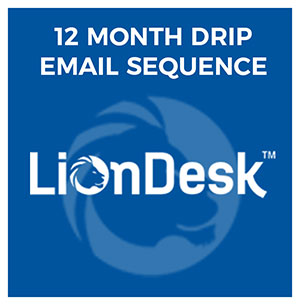
A strong followup or drip email sequence is a critical piece of the conversion pie. Drip emails are an automated sequence of emails, usually spaced out over days, weeks, and months, that begin to send once you’ve received the lead information.

A strong followup or drip email sequence is a critical piece of the conversion pie. Drip emails are an automated sequence of emails, usually spaced out over days, weeks, and months, that begin to send once you’ve received the lead information.
Our current favorite CRM is LionDesk (liondesk.com) – and that’s the CRM that we use for all of Janie’s lead management and drip email.
By the way guys – we do not have any sort of business arrangement with LionDesk – in fact of all of the companies I’ve mentioned in this article, the only one that we’ve got an affiliate relationship with is ShowcaseIDX.
Now back to CRM, as far as LionDesk goes, there is no other CRM in the market that provides more bang for the buck – for a single agent, you’re looking at $25/month!). Seriously… they rock, and our clients love them too.
For Janie’s campaigns, we set up a 12 Month drip email sequence (which we do and recommend for all of our campaigns).
For the first week or so, we’re sending roughly an email a day, and from there the campaign becomes much less aggressive. Every single email tries to provide value in some way.
Here’s a quick sampling of what some of those emails look like:
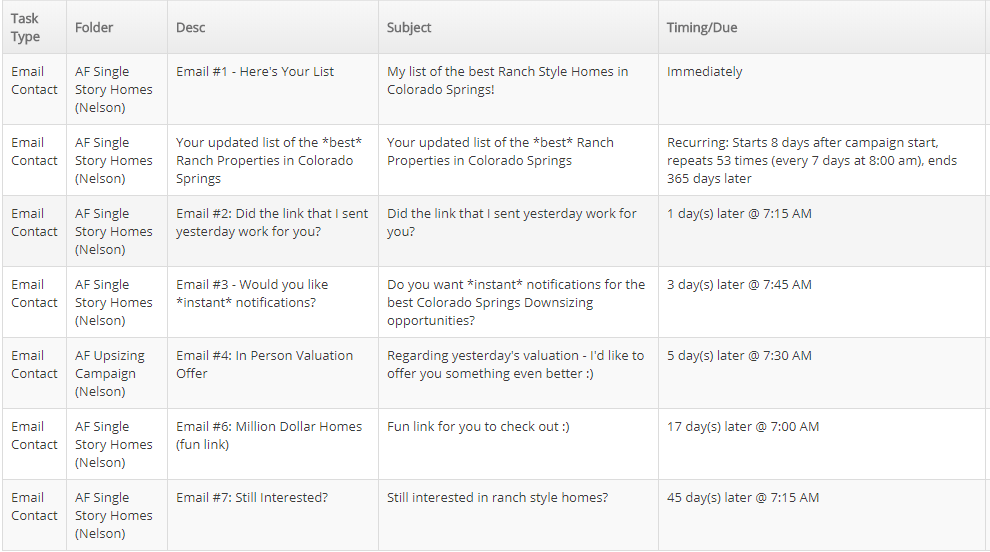
6.1 Important Note on Drip Emails… Be Personal!
Extremely important – make sure that your drip emails are *not* spammy.
Over the last few years I’ve been in contact with thousands of individual agents, and very often I find myself enrolled into their drip emails. It never ceases to amaze me the sort of absolute crap some agents send out.
Click the button below to learn more about pricing.
I think most agents have this idea in their head that it’s better to reach out and touch someone with something than with nothing. I can assure you, if the stuff you are sending is generic, templated crap that you yourself would delete with anger if it found it’s way into your inbox… well I’ll let you process that.
That being said, when it comes to drip email, you have to consider what your objectives are. Here are what mine would be:
- Stay top of mind
- Offer / Provide value
- Demonstrate Expertise
- Sound like I wrote the email myself even though I’ve got it on auto-pilot
- Show enough personality to stand out and maybe crack a smile – people want to do business with nice people, and a little personality does wonders to break down barriers.
So here’s a good example of a really successful email that I setup for an ebook download.
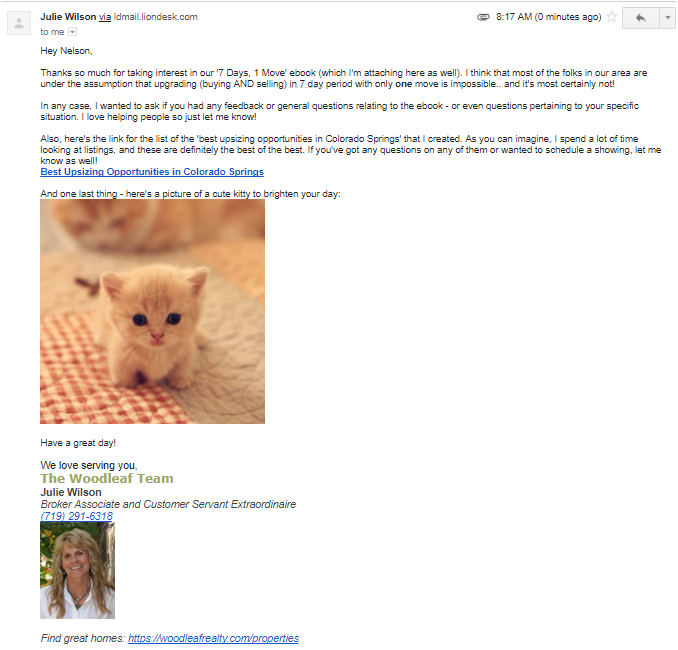
6.2 Notable Mention: Listing Alerts
Similar to drip campaigns, listing alerts can send automatic emails to people who subscribe to your email list – and are a great tool especially for clients who are in the market to buy.
For our clients, this is mostly done through our preferred IDX – Showcase IDX (full disclosure, we’ve got an affiliate relationship with them, but they’re seriously the best IDX available for WordPress hands-down). When visitors are searching for properties on an AgentFire website using Showcase IDX, they can be prompted to sign up for email alerts on specific listings or property searches that they set up.
The alerts/updates can be set at specific intervals that suit your preference. IE: Daily, Weekly, Monthly (ShowcaseIDX actually has an instant notification feature which is killer)
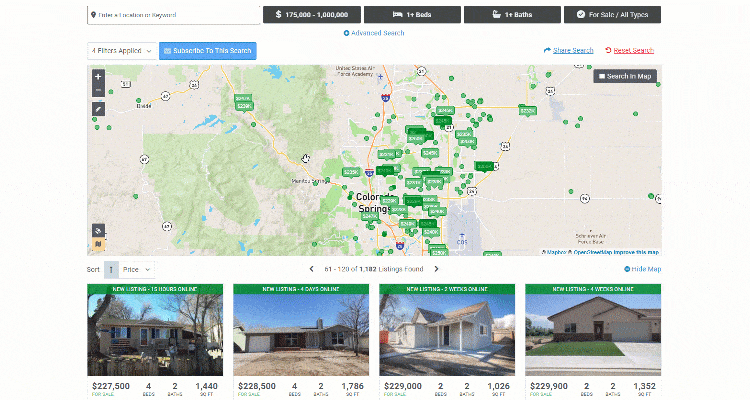
Pro Tip: You should periodically scan the list of prospects that you have receiving listing alerts, and reach out with a personalized email about an individual property (or small group of properties) that you think this person would love based on the criteria they seem to be favoring. I.e. If you see someone has created an alert for ‘bethel school districts’ – reach out directly with the property or properties you think represent great value.
Step 7: Google Remarketing
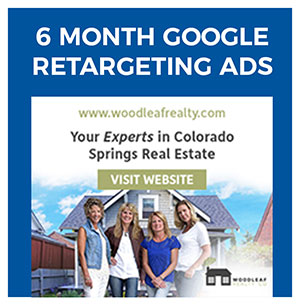
*Editors Note* – We did all of our remarketing through Google only, since at the time, we didn’t have much experience with Facebook remarketing, and we didn’t want to waste any of our limited budget testing stuff when we knew we could generate definite results through Google. If we had to go back in time, we’d use a mix of both.
Ok… whew… so we’re going to go into pretty heavy detail here as well. If you’re going through this article in one shot, now may be a good time to grab some more ☕.
I’m also going to make a statement – I believe that used properly, Remarketing on Facebook and/or Google represents the absolute HIGHEST ROI possible that you’ll see for your marketing dollars.
So first let’s look at how Google Remarketing works:
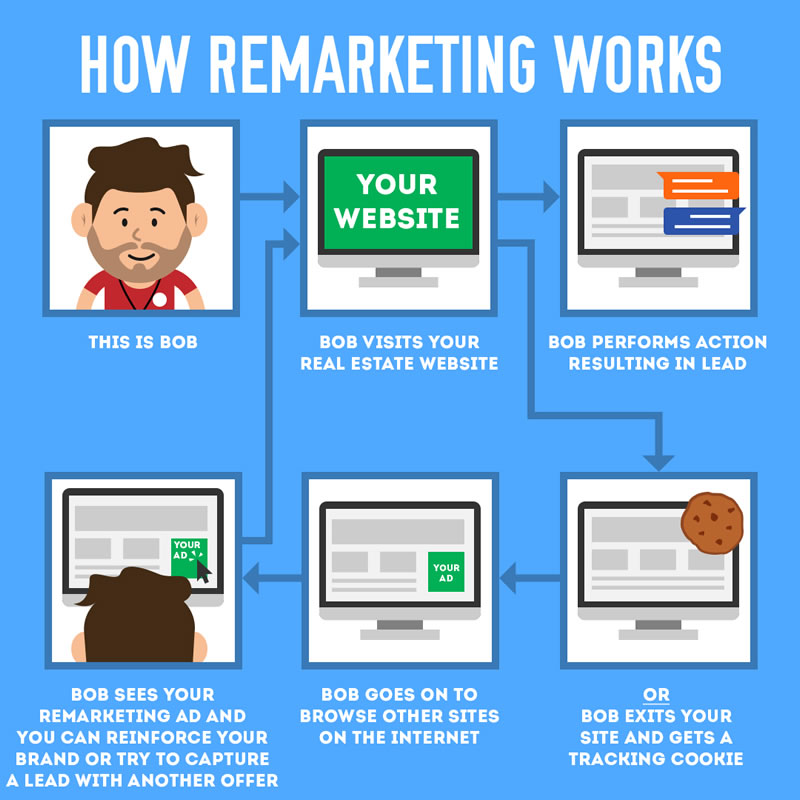
So, let’s explain this in real basic terms:
If you DON’T have Remarketing Setup: 98% of all website visitors that visit your website are not going to convert into a lead – once that visitor is gone, they’re gone forever.
If you DO have Remarketing Setup: That 98% of website visitors that didn’t convert are now going to see your advertisements follow them around the internet for a period of up to 180 days as they’re browsing the web – which is a massive second opportunity!
*Important Note* – What we’re talking about here is all website traffic. Obviously as you can see in the case of Janie’s campaigns, when you’re running a targeted ad and landing page, you’re going to have much higher conversion rates (ours was closer to 14%, and would have been even higher if we didn’t require phone numbers).
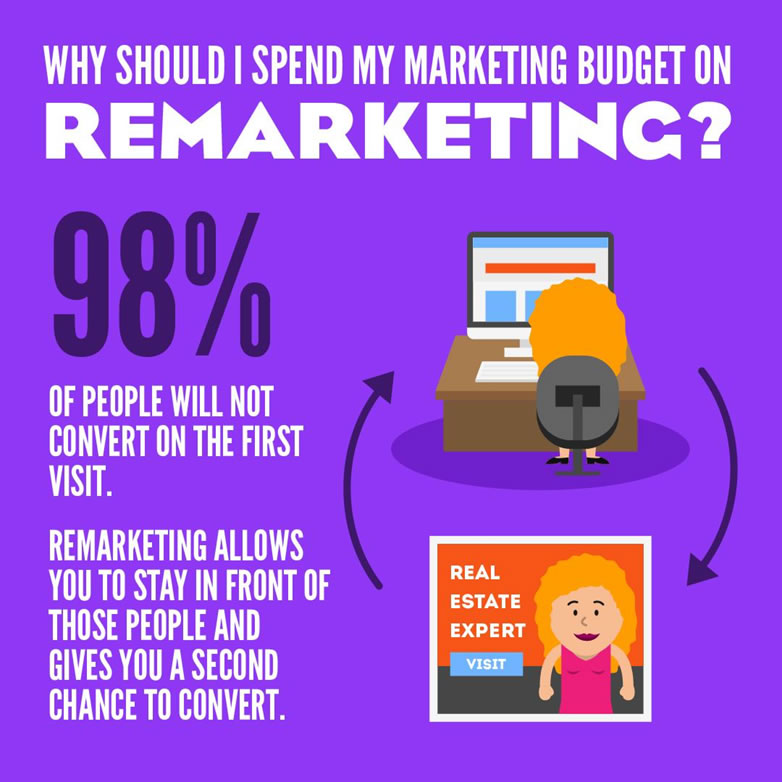
Bottom Line: EVERY REAL ESTATE WEBSITE SHOULD HAVE REMARKETING SETUP AND RUNNING!@!@!
7.1 Reasons for Remarketing
Bear with me folks, I need to really hammer in how important this is. Let me explain now the specific reasoning for using Remarketing.
Unbelievably Cheap:
I kind of hate saying that, since I do believe that in life, you generally get what you pay for. Like Ikea furniture, which has never lasted more than a year for me. Anyway, with all marketing, the cost is generally a confluence of numerous factors – one of the biggest ones is how ‘competitive’ the keywords or ad space is.
With Facebook Marketing, you can target people based on their interests, likes, age etc. This is generally casting a pretty wide net.
With Google Adwords, you can target people based on keywords, zip codes or areas, etc. This is generally casting a decently wide net.
With Facebook and Google Remarketing, you can target the exact people that visited your website. You’re not casting a net, you’re using a sniper rifle. By only marketing to such a select group, your costs will be absolute peanuts in the scheme of things. If you’ve got a killer website that’s built to convert, then it makes sense to try to get as many of your visitors back to your website as possible.
I’m very proud of this analogy, I’m going to have one of our designers turn it into a graphic.
Here’s that Graphic:
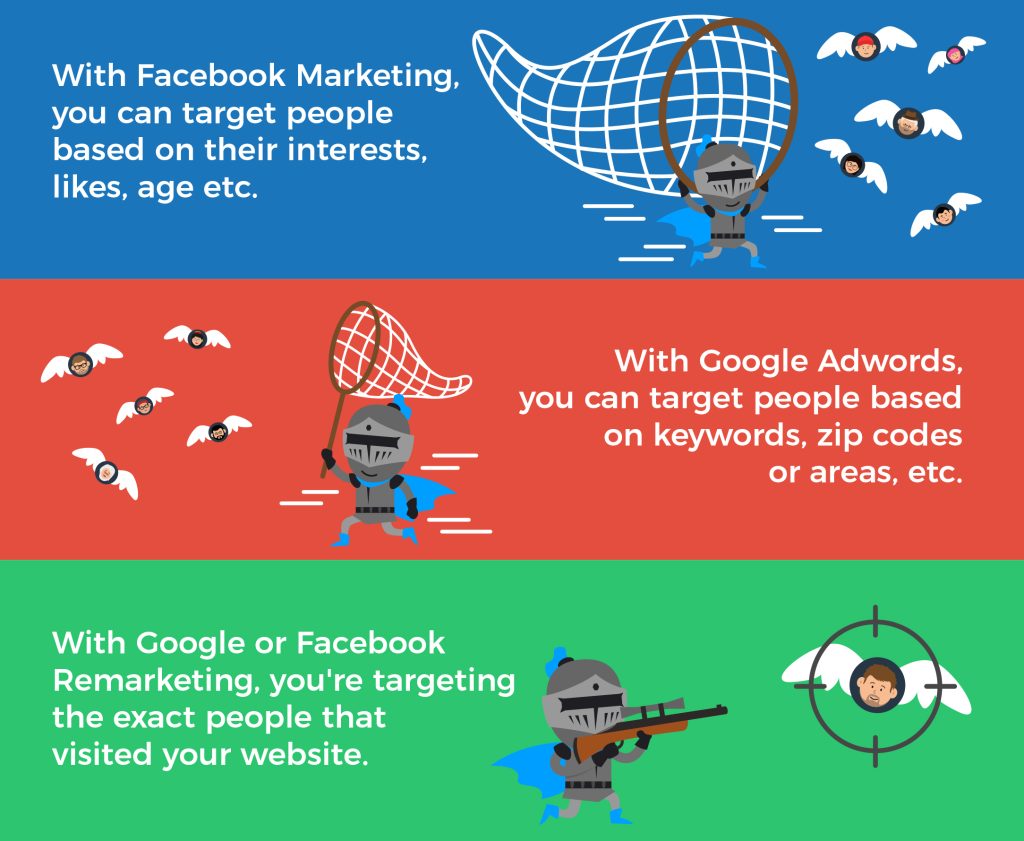
Second Chances:
As mentioned above, the vast majority of people who visit your site for the first time won’t turn into a lead. Remarketing gives you a very inexpensive way to get a second crack at them.
Branding & The Subconscious:
If your ads are following them as they browse the web, you’re branding yourself and forming positive subconscious associations with the people seeing them. What ‘type’ of impression you leave will depend on the actual ad itself, as well as how frequently you show it.
We’ve got a client that has such aggressive remarketing that I see his ads literally 100’s of times a day – I’ve never seen anything like it. At first I thought it was poor use of budget, but now I’m rethinking things. I literally see his ads in my dreams. This morning I was looking at a cereal box and it turned into his ad.
He’s become the subject of numerous meme’s in our company slack channels.
We actually had a client write in who said that they visited his website, and I quote ‘now cannot seem to escape him.
That’s powerful, no?
Be There When They’re Ready:
We all know that the buying & selling process can be a long one. A very common scenario is that someone visits your website during the initial stages of their search, and then clicks onto one of your real estate retargeting ads a month later and turns into a lead/deal.
Retarget With A Different Offer:
Let’s say someone visited your site because you were running an ad on Facebook for New Construction properties in a specific neighborhood. Maybe you had 5000 clicks to that page on your website. You can now target those 5000 people with a different but relevant offer.
Ex: ‘Interested in New Construction? – Sign up for my Top 10 List’ or ‘I’m a New Construction Expert – let’s grab coffee and talk new construction real estate’
7.2 Order really nice ads, in less than 5 minutes, for $5
As mentioned previously in this article, if you need some gorgeous remarketing ads created quickly and on the cheap? Check out fiverr.com and do a search for remarketing ads, google remarketing, facebook retargeting ads, etc.
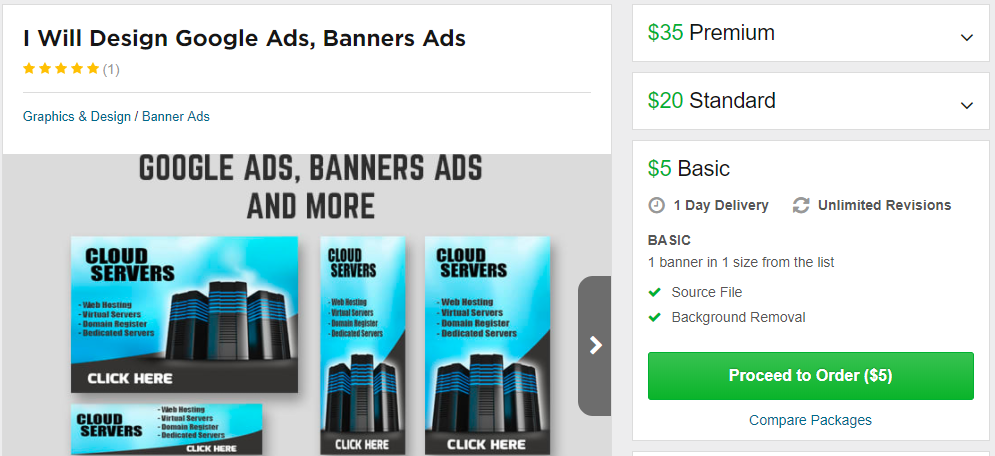
Pro Tip: For Google, you should go with what are called ‘html5’ ads – all this means is that your ads will be animated instead of static. For examples of some of the animated html5 ads we had created for Janie’s campaign, check section 7.6 below!
7.3 Which Sizes to Order Your Ads
For Google, you’re going to need to know which ad sizes you want created. Here’s my recommendation, which is based on which ad sizes historically convert the best:
- 250 x 250 – Square
- 200 x 200 – Small Square
- 468 x 60 – Banner
- 728 x 90 – Leaderboard
- 300 x 250 – Inline Rectangle
- 336 x 280 – Large Rectangle
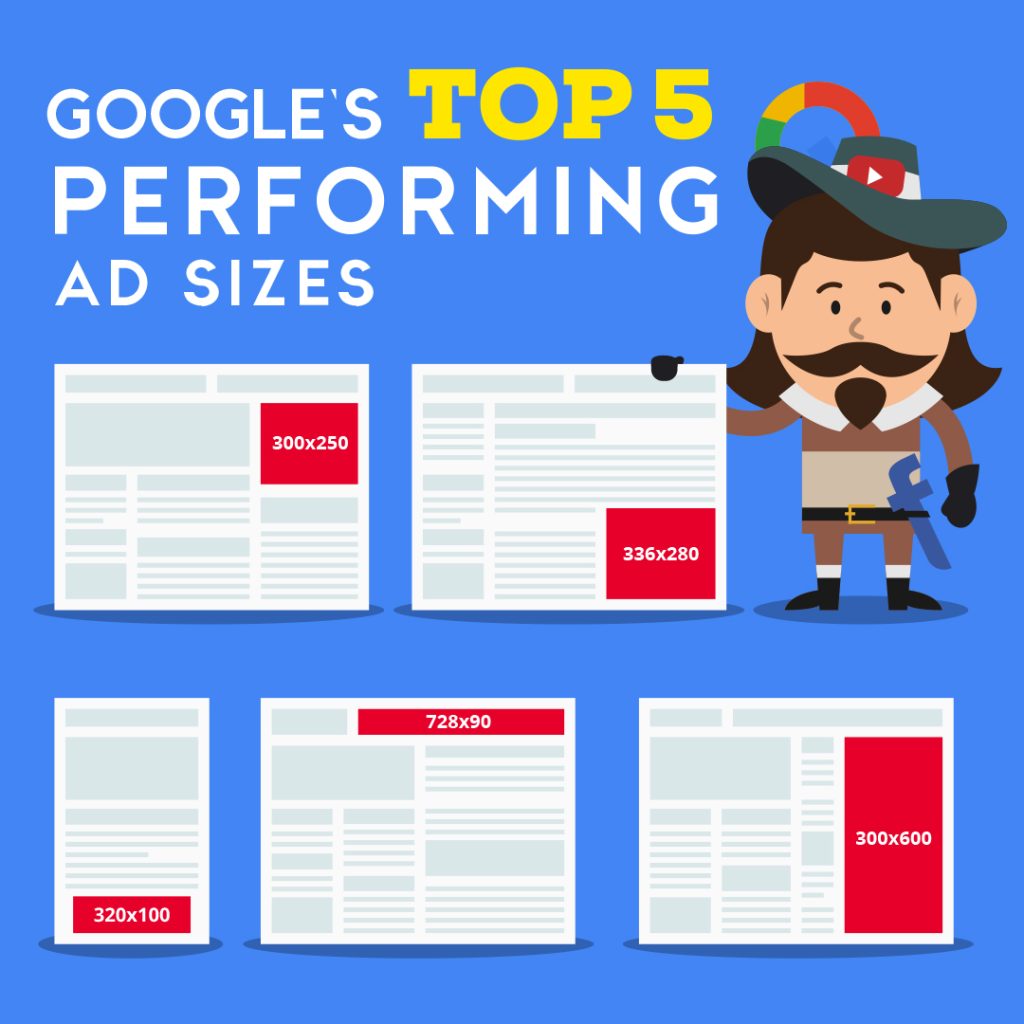
7.4 Brand Remarketing
When it comes to remarketing, my recommendation is to start with some simple Brand Remarketing. This basically revolves around creating ads that communicate hyper-local area expertise and/or social proof.
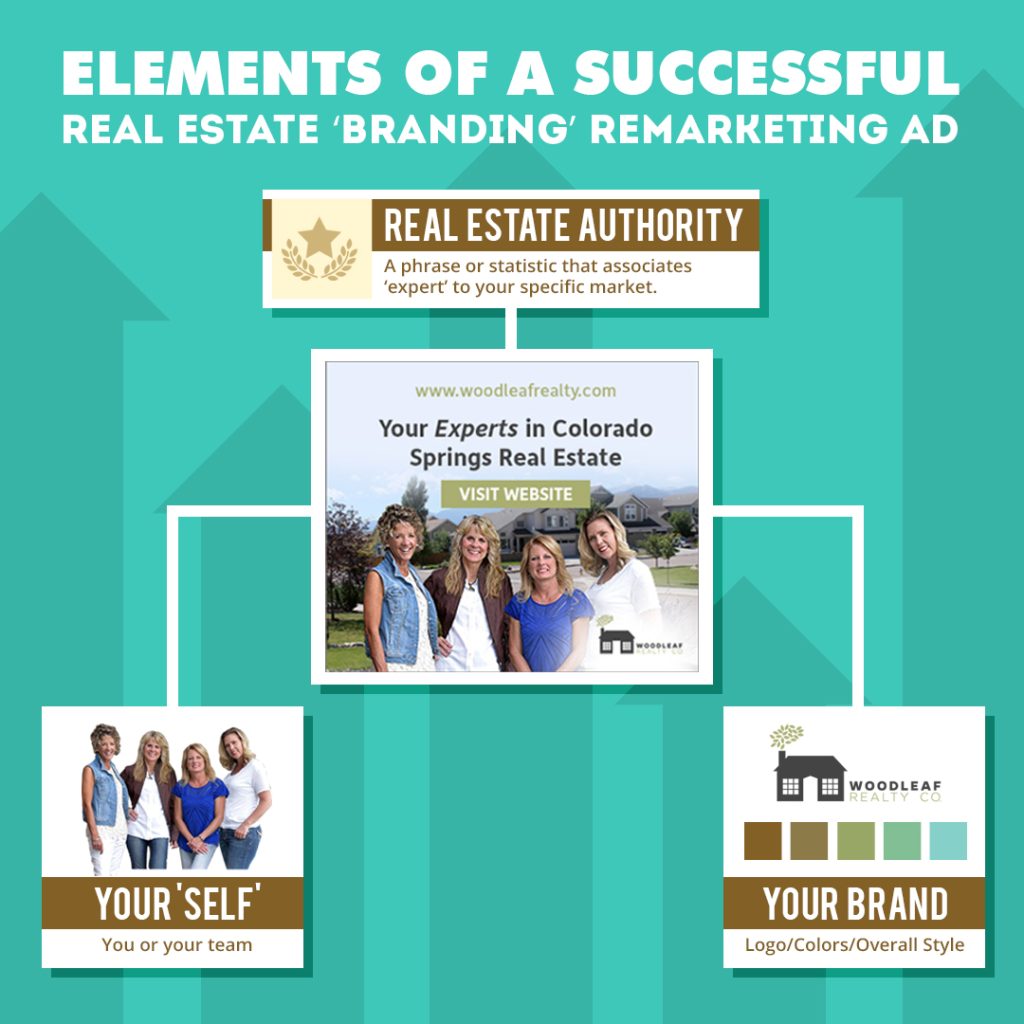
Later on, if you want to get more advanced with your remarketing, you can run campaigns that focus on some sort of secondary offer.
So ‘Brand Remarketing’ is remarketing with the objective of creating awareness and positive sentiment towards your ‘brand’.
‘Secondary Offer Remarketing‘ would be something like remarketing a ‘Free Buyer Guide’ type ad to people who have visited IDX pages on your website.
7.5 Ad Frequency and Duration
When setting up your remarketing ads, two of the most important decisions are how many times per day and for what duration your ads should show.
My recommendation would be to show your ads at least once per day, for a period of 6 months.
Note: I used to be under the impression that you shouldn’t spam your ads, but I’m actually starting to change my position on that. Remarketing is so cheap comparatively speaking, and good brand remarketing should effectively cement the association relationship between ‘you’ and ‘Real Estate’ that your site visitors have in their head. You should experiment with different ad display frequencies yourself to see which works best!
Pro Tip: Gorgeous ads are cheap if you order them through Fiverr. To keep your ads from becoming repetitive, I recommend having multiple ad sets created, and switching them up every month or two.
7.6 A/B Test Your Remarketing Ads Too!
When you’re getting your ads created, you’ll often have the option to include a few minor variations.
Have some fun and test here. In the example below you’ll see we tested using Discover and Learn More for the button CTA – and it turned out that Discover got more clicks at a lower cost!


Looking back – what would we have done differently?
I don’t think that there’s much that we would have done differently, but I’ll mention two things.
Google Adwords
I do think that under normal circumstances (i.e. not a fixed budget and 2 month time frame) what makes most sense if you’re going to be setting up your own campaigns, is to actually start with Google Adwords. It’s more predictable and easier to reliably produce results, especially in the early goings. Once you find keywords and landing page combinations that you’re really hitting on, that’s when you should start diving into some niche type campaigns on Facebook.
Google Remarketing Secondary Offer
The Google Remarketing that we did for Janie’s campaigns was ‘general branding’, which is great and definitely worked well – however I would have also liked to test a bit more ‘secondary offer’ type stuff.
An example of that would have been, for anyone that visited the ‘first time homebuyer’ landing pages – to have done remarketing with an ad graphic and landing page offering a ‘free first-time homebuyer in person consultation’ or something along those lines.
By the way…
If you’re in the market for a cutting edge real estate website, why not quickly check out our complete tour overview video on our tour page and see for yourself all of the ways that an AgentFire can improve your brand and hyper-local presence, generate more leads, and close more deals.
I started this company in my parent’s basement back in 2013, and heading into 2018 we’re now a team of 30+, with hundreds of satisfied clients across the U.S. and Canada. We were also the top publicly reviewed real estate solution of all of 2017 (based on all available public reviews, minimum of 50 reviews) – our product has never been better, and the best is yet to come.
New for 2018 are our AgentFire Sites, which have all of the same features and functionality as our custom websites, and at a fraction of the cost.
Seriously, do yourself a favor, take just a few minutes and check us out!
Closing Thoughts
Welp… we’ve reached the end! I really tried my best here to provide as much value as possible, I really hope you guys feel that I delivered on that promise.
As I mentioned earlier, if you have any comments/questions/things you want to see more of or explained better, just let me know in the comments for this video!
If you guys enjoyed this – then I’ve got some ideas for ‘deep dive’ type articles and videos that I’d like to explore moving forward – for example, I’d love to do a full case study on Google Remarketing – but I’d love to hear your suggestions first.
With the tremendous success of the campaigns detailed in this case study, we’ve now launched this site where we’re going to wage all-out war (pun intended) on the ‘military relocation’ niche in Colorado Springs. This is a tricky niche where we see tremendous opportunity, so maybe we’ll do a case study for that with much more of a Google Adwords if enough people ask for it!!
Lemeno and best of luck in your own personal online marketing efforts! ?

